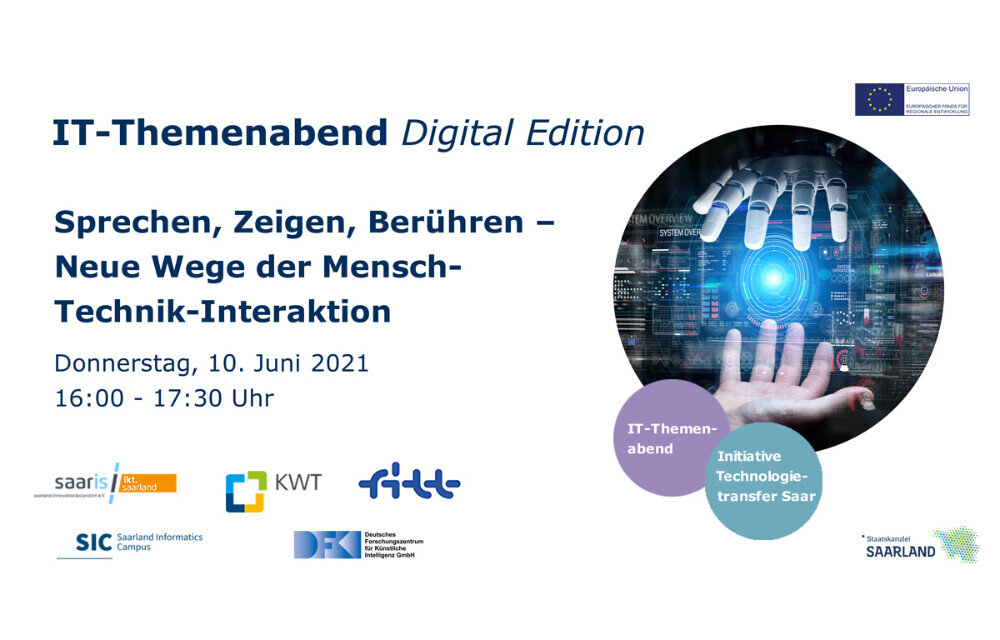New ways of interacting with IT systems will significantly shape our future – and this offers great potential for innovation, including in industry and the entertainment sector. Information technology and computer systems have long been an integral part of everyday life. However, the way we interact with this technology has changed dramatically in recent decades. The keyboard and mouse are now considered a thing of the past, and many astonishing things are already possible today, from touchscreens and touch-sensitive tattoos to brain-computer interfaces.
The 16th IT Theme Night, entitled “Speak, Point, Touch: New Ways of Human-Technology Interaction,” will focus on the question of what interaction with information technology might look like in the future and what society’s attitude to it will be. Four experts from Saarland University, the German Research Center for Artificial Intelligence (DFKI) and the University of Applied Sciences in Saarbrücken will give insights into the latest findings from the research field of “Human-Computer Interaction” and answer your questions. Afterwards, there will be a digital get-together.
Program:
Start 16:00
Greeting Mirko Roca, Contact Point for Knowledge and Technology Transfer of the UdS
Talk 1: Making virtual worlds “graspable” – perception as an activity
Computers are considered an audiovisual medium, because so far they mainly address the senses of sight and hearing. To open up further forms of perception such as the sense of touch using computers is interesting for many applications – think of VR and AR. The important thing here is that perception is an active process and not something that happens to people passively.
In his talk, Dr. Paul Strohmeier (Saarland University) explains how understanding perception as an active process is giving rise to new design approaches for IT applications. He focuses on the field of haptics and discusses how materials, forces and movement can be transferred to the digital.
Talk 2: With all senses – multimodal interfaces for the shopping of the future
Digitization in shopping is mostly associated with online shopping. But smart human-technology interaction can also offer an improved shopping experience in stationary retail. In this context, it is important to consider the needs of customers and employees alike and to ensure that the technology used meets these needs.
In his presentation, Frederic Kerber (German Research Center for Artificial Intelligence) will show current demonstrators from the Innovative Retail Laboratory (IRL) and explain how the incorporation of technology can enhance long-established interaction concepts, but also create new ones.
Talk 3: Brain-Computer Interfaces and Affective Machines in the Evolution of “Human-Computer Interaction”.
The closer humans and machines come together, at work or at free time, the greater the need for intuitive human-machine interfaces (HMI) that provide the user with maximum freedom of action. Future HMI will be able to precisely anticipate the user’s current attention and emotional state and adapt to their situational needs. The further development of HMIs will range from contact sensors (wearables) and contactless recording of psychophysiological parameters to fully implantable brain interfaces.
Dr. Lars Haab from the Systems Neuroscience & Neurotechnology Unit (htw saar & Saarland University) will highlight applications and development status of neurotechnology in the fields of HMI and affective computing in his short presentation.
Talk 4: Is it filming right now? How the design of technology influences social acceptance.
Mobile devices, wearables, e-textiles – new technologies are becoming more and more a part of us. But: New kinds of devices can seem unfamiliar or even alienating to many people – just think of the example of Google Glass. That is why the discussion about human-technology interaction should always take into account the effect of new developments on the environment.
In her presentation, Dr. Marion Koelle (Saarland University) will present current findings on the topic of “social acceptance” from the research field of human-computer interaction. Among other things, she will clarify what social acceptance means and for which technologies it is relevant.
17:15: General Q&A session /discussion.
Followed by a digital get-together
The event runs in the context of the Saar Technology Transfer Initiative of saaris, KWT and fitt and is organized together with DFKI and the Competence Center Computer Science Saarland. Participation is free of charge.
Image: ©DFKI

